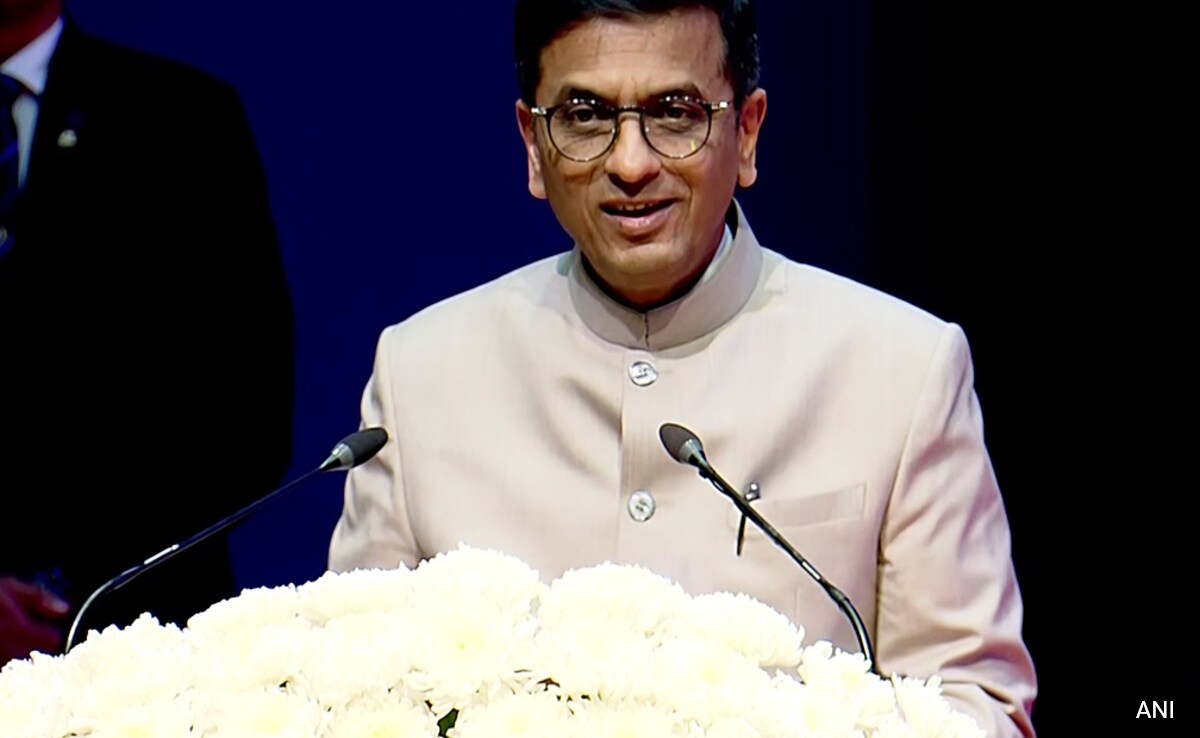2024-02-04 13:37:33

India is undergoing its demographic change, CJI DY Chandrachud said (File)
Vadodara:
Chief Justice of India DY Chandrachud on Sunday said he is amazed at the capacity of the younger generation to rise to the occasion and address the enormous challenges of the present time. He also advised the youth to learn from failures.
The CJI appealed to younger people not to get swayed by unrealistic expectations and stressed that life is a “marathon and not a 100-metre sprint”.
Virtually addressing the graduating students at the 72nd annual convocation of Maharaja Sayajirao University of Baroda in Vadodara, Justice Chandrachud said that out of the 346 gold medals this year, the university awarded 336 to women, which he called “truly a sign of changing times in our nation”.
Calling the current period a “unique time in our history”, Justice Chandrachud said technology has made people more connected than ever before but has also exposed them to their worst fears and anxieties.
“We see new and unique professions emerging every day, people charting their professional journey which does not comply with traditional yardsticks. This is an exciting time to be graduating. But I am aware that these circumstances also give rise to unparalleled uncertainties and confusion,” he said.
The legal luminary told the students, “As much as you are fortunate to be living at a time when you are more exposed to ideas than ever before, you are also a unique generation that is made aware of the challenges of our time more than any generations before you.”
He said he was amazed at the capacity of the younger generation “to rise to the occasion and address the enormous challenges of our times”, and urged them to take their time, not get swayed by unrealistic expectations, and learn from their failures.
“One thing that our formal education does not prepare for us is how vital failure is to our growth. Our education system is designed for us to despise failure and have a paralysing fear of it. However, life is not meant to be free of failures,” he said.
Failures in life are designed to introspect and emerge as a better person, he said.
“Do not ever be disheartened by not having solutions to all the problems which you face, not knowing all the answers, or failing from something from time to time,” he said.
The primary purpose of education is to make one a better person, a leader, a good citizen, and someone who cares deeply about the people and world around him, the chief justice said.
Knowledge and education nourish the mind and enable young, optimistic, and hopeful people to create a society which our freedom fighters aspired for, he said.
He said that India is undergoing its demographic change when the present and future belong to the young.
“This will naturally affect you in some adverse ways. But the recipe to sail through this life is to know that life is a marathon and not a 100-metre sprint,” he said.
He also urged graduates to become intellectuals and not just learned persons. An intellectual is someone who engages deeply with ideas, theories, and concepts and is known for their critical thinking skills and analytical abilities, he said.
“As you pass on from the shelter of the university, you must use your foundational learning and transform it into a life and ethic of intellectualism,” Justice Chandrachud said.
He said that the terms ‘learning’ and ‘intellectual’ are often used interchangeably, but there are important distinctions between these two.
Quoting Dr Bhimrao Ambedkar, the father of the Constitution, he said that “a learned person is one who is conscious of his class and makes decisions only in the best interest of his class, but an intellectual is an emancipated being who is free to act without being strained by class consideration”.
“You may choose to remain only a learned person. But your empathy towards your companions, your zeal to leave the world a better place than you found it, and your abilities to use your education to channel these emotions will definitely make you an intellectual,” Justice Chandrachud added.
For educational institutes and educationists, he said, it is both a huge responsibility and an opportunity to play “a prominent role in creating a capable and intelligent class of citizens who can take our country to new heights”.
Justice Chandrachud also talked about the rule of the erstwhile king of Baroda state Maharaja Sayajirao Gaekwad III and said he is known to have contributed immensely to education and public welfare.
It was during his rule that Dr Ambedkar was given a scholarship to pursue higher education, he said. This helped Ambedkar visit the US for higher studies which exposed him to the egalitarian idea of liberty and emancipation.
Gujarat Chief Minister Bhupendra Patel, Education Minister Rushikesh Patel, and the university Chancellor Shubhanginiraje Gaekwad were also present at the convocation ceremony.
(Except for the headline, this story has not been edited by NDTV staff and is published from a syndicated feed.)
DY Chandrachud,Maharaja Sayajirao University of Baroda
Source link
10 total views , 1 views today
